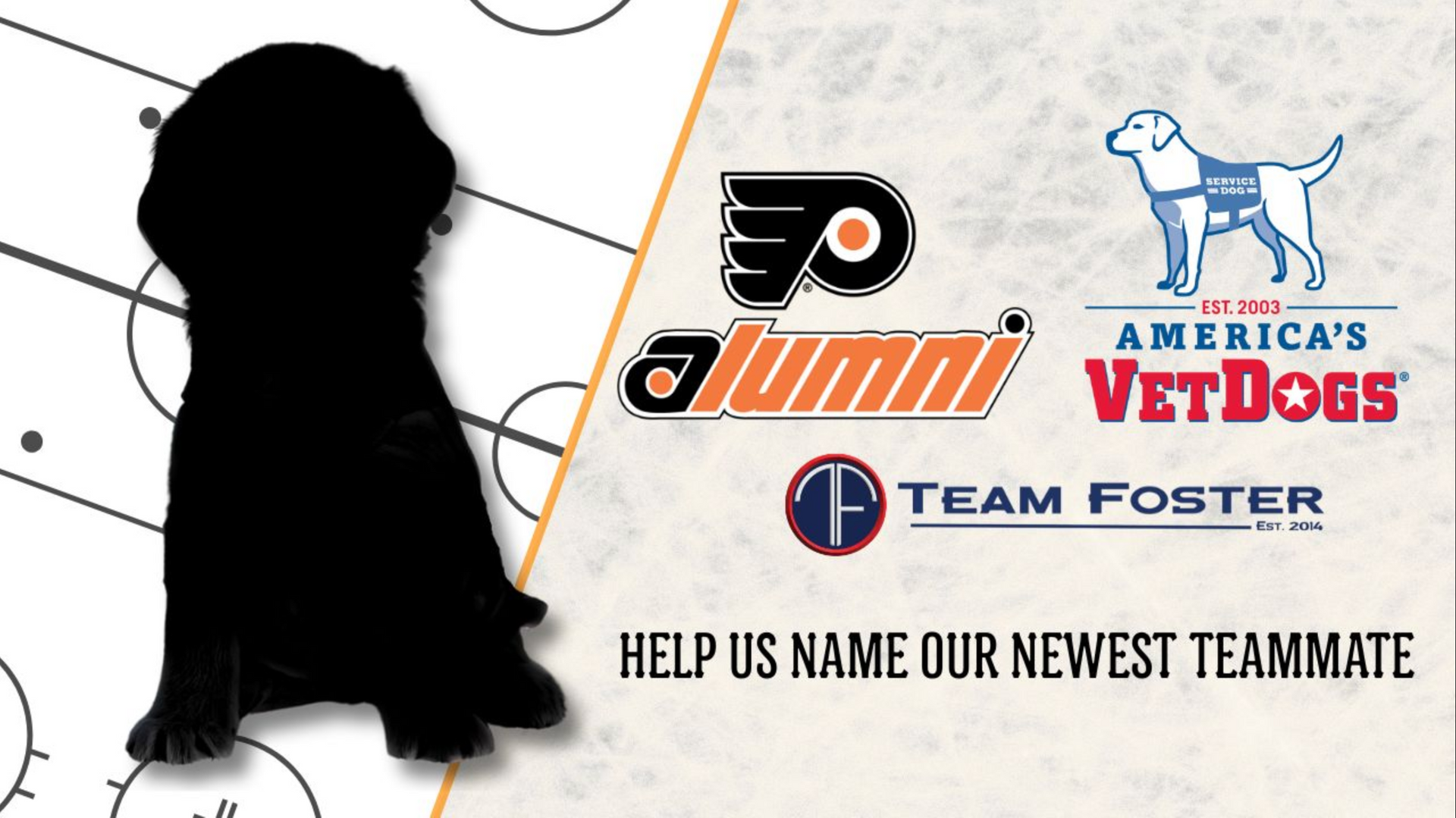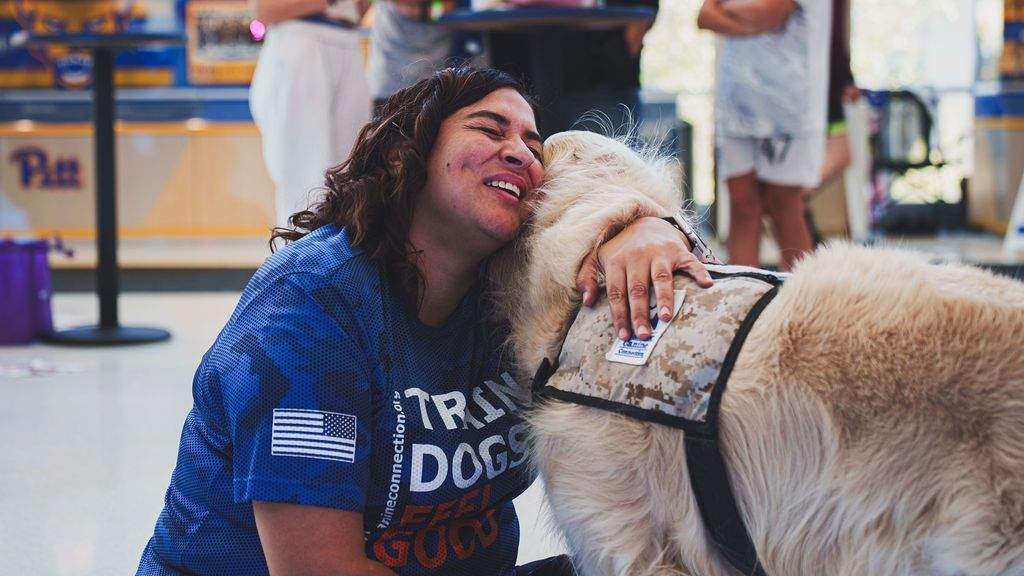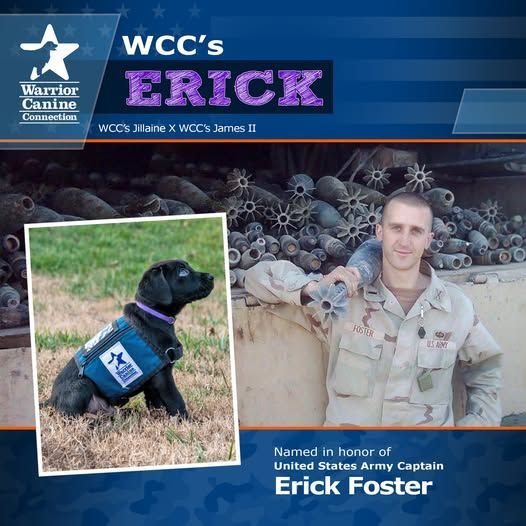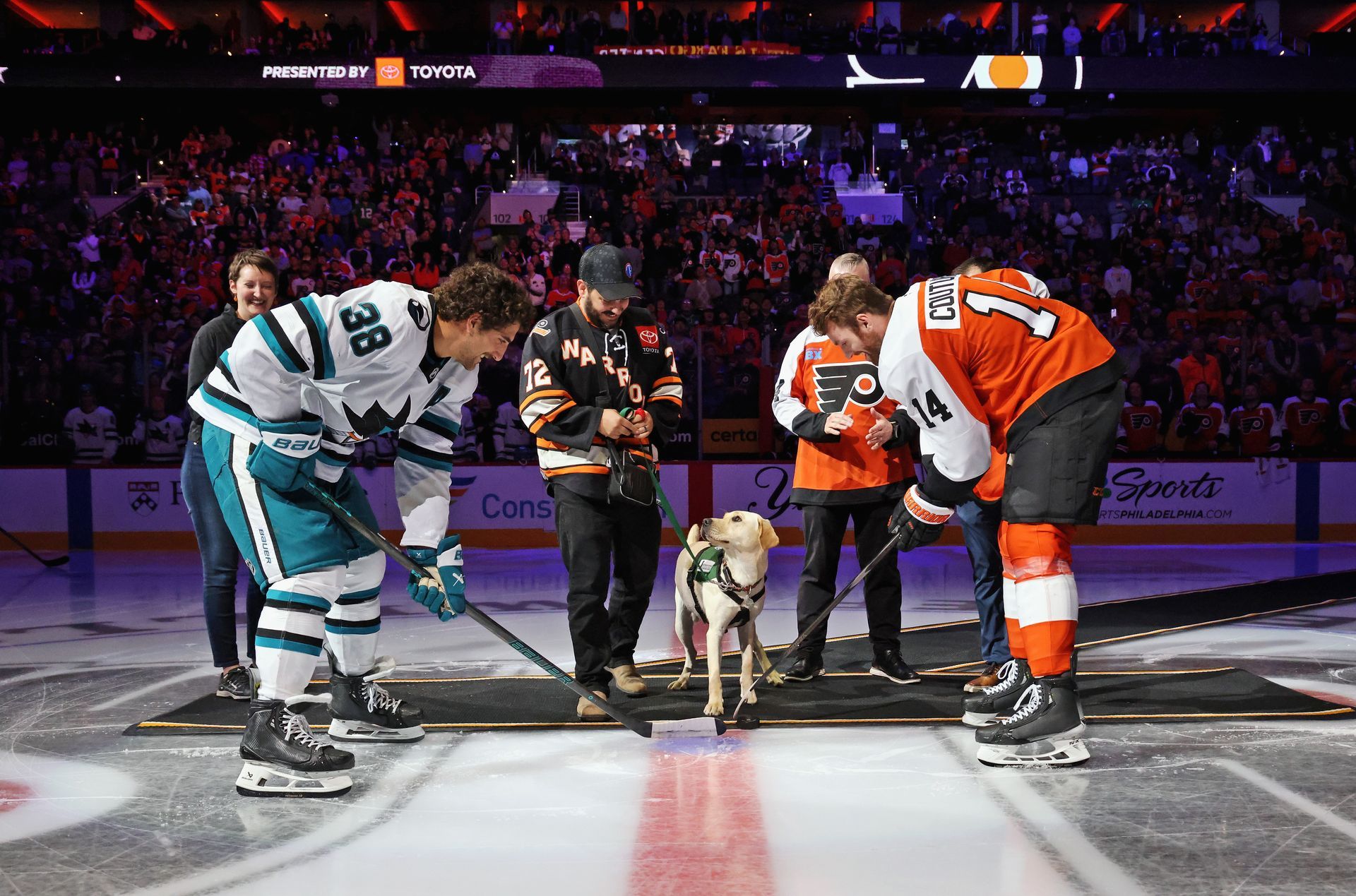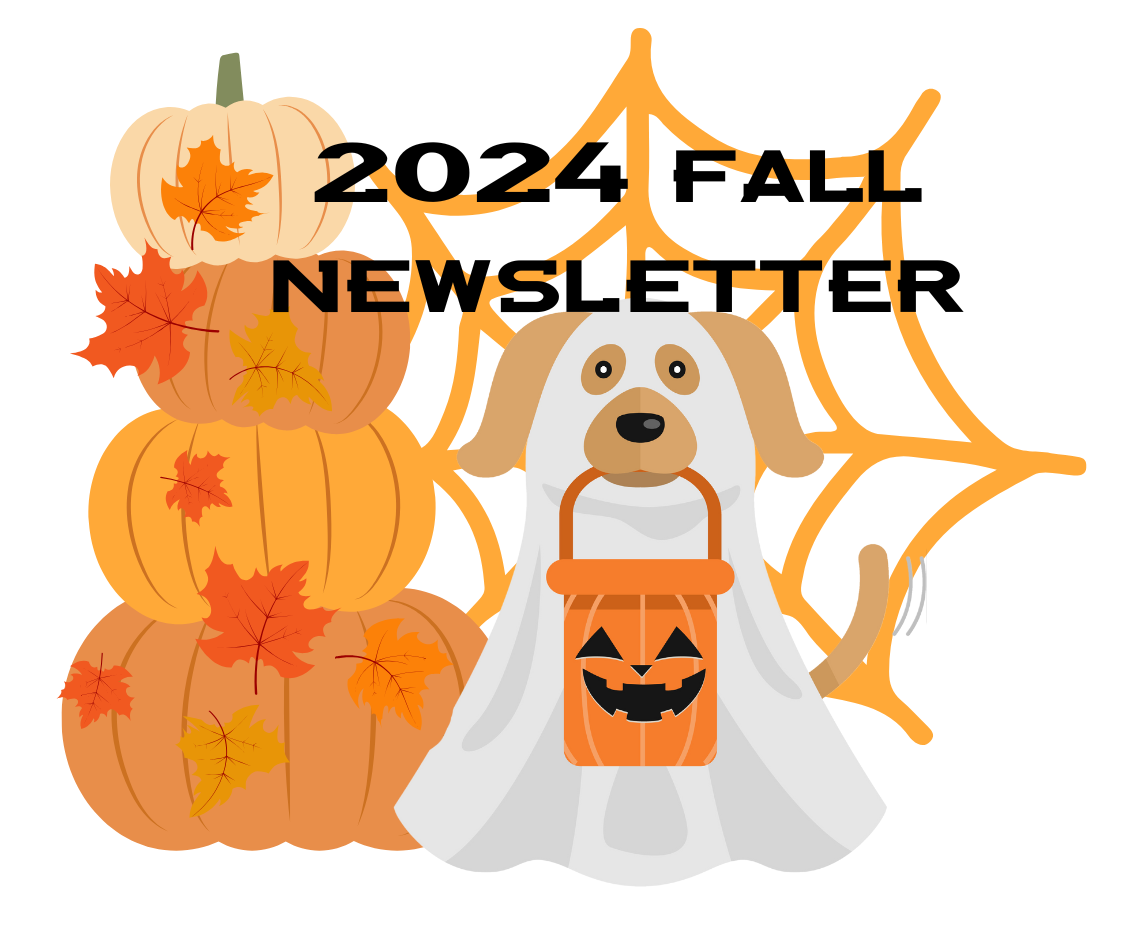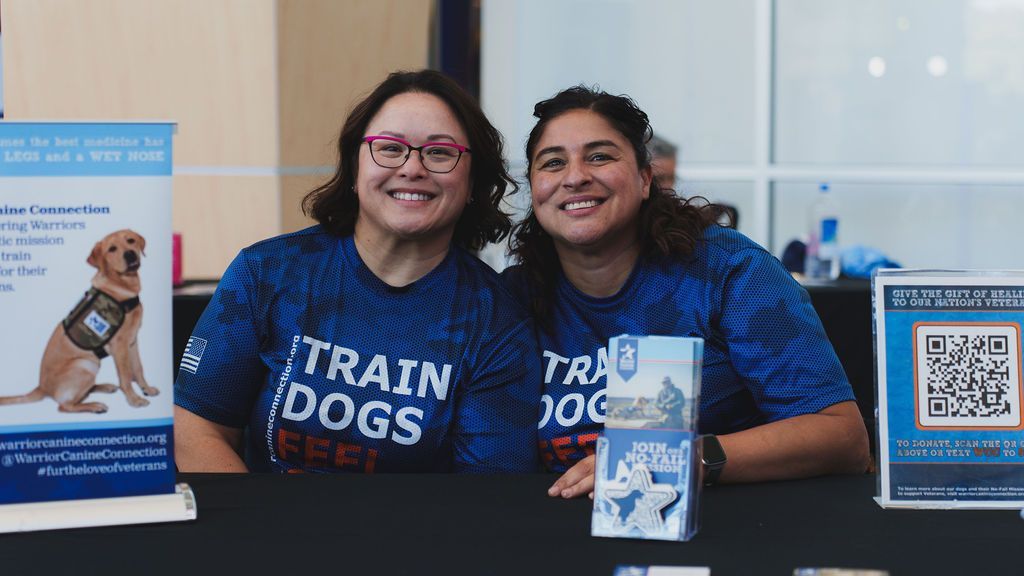Training service dogs for military members is therapy for veterans at Penn’s new program
Training service dogs for military members is therapy for veterans at Penn’s new program

Curious passers-by often can’t help but peek into Jennifer Desher’s office on the University of Pennsylvania’s campus: On any given afternoon, she’s playing host to a handful of rambunctious puppies as young as nine weeks old.
But Desher isn’t running a doggy day care. She’s training a set of service dogs, specially bred for a new program on Penn’s campus that aims to help veterans who need a service dog — and other veterans who can benefit from training them.
The program, a partnership with the nonprofit Warrior Canine Connection, describes its work as “mission-based trauma recovery.”
Veterans accustomed to regimented military life, in which they’re responsible for their own safety and, often, protecting others, can be reticent to accept help, Desher said. But training a service dog for another veteran can be a back door into a therapy of its own, she said.
While teaching the dogs to assist with emotional and physical needs, veterans can benefit from the physical and psychological connection with the dog.
“They have to provide support to dogs in public outings, and rather than focusing on past trauma, they can focus on the dog, so the dog can have a positive experience,” she said. “And they can learn how to support themselves in similar situations.”
Service dogs are in high demand to help people with an ever-growing list of physical disabilities and emotional needs. Support animals can brace themselves against owners about to have a seizure, detect when a child with diabetes has dangerously low blood sugar, and help complete household chores. But such specialized help can cost thousands of dollars per dog — a price that’s untenable for many families already struggling with a medical diagnosis.
Penn is offering free office space to Warrior Canine Connection trainers, while a $100,000 donation from the veterans support nonprofit Team Foster funds the trainers’ pay. Veterans themselves receive their dogs for free.
Jennifer Desher, program manager and trainer at Warrior Canine Connections, practices commands with Byron, a service dog in training, at the University of Pennsylvania. The group is partnering with Penn on a new program to help veterans on campus overcome trauma by training service dogs for other veterans
Erin Blewett
A special mission
Desher’s husband is in the Air Force; she’s been training dogs, mostly for civilian pet owners, for the better part of a decade. She became even more convinced of how dogs can help humans heal while talking to veterans about their experience during her training for the new Penn program.
“I would go home crying,” she said. “It’s amazing what it does for them.”
Launched in 2008, Warrior Canine Connection partners with the Veterans Administration for research on how service dogs, and training them, can help veterans, and has a handful of locations around the country, Philadelphia now among them. Dogs are bred specifically for the program and are mostly Labradors and golden retrievers — breeds smart and sturdy enough to help veterans with both mental and physical disabilities.
The dogs learn how to soothe an anxious owner — leaning their head on a veteran’s jittery knee, for example, or pushing their nose into shaking hands. They comfort veterans who are unnerved by crowds, acting as a barrier between their owner and large groups of people and safely navigating them through a congested area.
They also learn how to assist veterans with physical disabilities — for instance, serving as leverage to help someone with mobility issues stand up.
The specialty training service dogs go through teaches them to pick up stressors that their human companion may not even be aware of, said Paula Crawford-Gamble, a nurse and retired captain in the U.S. Navy Nurse Corps, who now heads Penn’s Veterans Care Excellence Program and spearheaded the initiative at Penn.
» READ MORE:
Service dogs help the disabled more than ever but fraud is growing
Though they don’t speak the same language, the service dogs are able to connect with humans at times of crisis and loneliness. This makes them especially valuable for veterans at high risk for suicide, Crawford-Gamble said.
“The dog calms the veteran down, tells them they’re not alone — and that they have a dog to take care of,” she said.
‘I feel so purpose-driven’
Crawford-Gamble first encountered Warrior Canine Connection while working at the National Intrepid Center of Excellence, which treats traumatic brain injuries in veterans. She now has a service dog of her own, Dollie, who helps her navigate the aftereffects of a TBI.
Crawford-Gamble has limited vision in her left eye, so Dollie guides her around objects she can’t see in her peripheral vision. Dollie also helps with the painful headaches her owner is prone to — sometimes placing her paws under Crawford-Gamble’s neck during an episode to provide comforting pressure.
Crawford-Gamble was surprised the first time Dollie performed the accupressure-like treatment — it is not a skill the veteran was aware the dog was capable of.
“She did that on her own,” Crawford-Gamble said. “She’s an innovative provider.”
Having a service dog has given her more confidence in day-to-day life, she said.
“I’ve seen it in a therapeutic setting where it has an impact on a veteran’s life — and now, to see it in a daily living environment and to see how effective it is, you know you’re doing the right thing,” she said.
Training the next generation of service dogs
Already, a number of military personnel who work on Penn’s campus have signed up to be “puppy parents” — providing a home to the five service dogs in training. The program hopes to take on as many as eight over the next six months and then more once another trainer is hired. Anyone can sign on as a puppy parent.
Jennifer Desher, program manager and trainer at Warrior Canine Connections, practices commands with Kallie, a service dog in training at the University of Pennsylvania. Kallie is living with her “puppy parent,” Lt. Dylan Sevick (right) while she receives training.
Erin Blewett
Col. Vincent Ciuccoli, the commanding officer of the Philadelphia Navy Reserve Officer Training Corps Consortium, is hosting Mosko, a 5-month-old black Lab — named, like all of Warrior Canine Connection’s dogs, after a former service member. Mosko’s namesake is Christopher Mosko, a Navy lieutenant and Drexel University graduate who participated in Penn’s ROTC program, and was killed in Afghanistan in 2012.
Ciuccoli lives in Blue Bell with his wife, four young children, two Yorkshire terriers, and a rabbit. Mosko, he said, stands out in the family menagerie.
“I feel so purpose-driven,” Ciuccoli said. “I would normally feed him table scraps or take him out to play with a ball, but I’ve always got that in the back of my mind, that we’re on a mission together.”
He joked that he takes Mosko’s training “almost too seriously.”
Warrior Canine Connection is currently recruiting veterans studying and working on campus to sign up to train the dogs.
The dogs’ full training will last two years, with veterans cycling through in eight-week stints to help teach the dogs 70 to 90 commands. After their training, the dogs are transferred to the program’s headquarters in Maryland to be matched with a veteran as a permanent service dog. The program reassigns dogs whose temperament may be better suited to other roles, such as living with a deployed veteran’s family, or acting as a therapy dog in a hospital setting, Desher said.
The dogs Desher works with on Penn’s campus are young, and still preparing for training with veteran volunteers. On a recent afternoon, she was working with a nine-month-old yellow Lab named Byron, using treats and commands to show him how to press pedestrian buttons at a crosswalk.
Later, a puppy parent brought in nine-week-old Kallie, whose biggest challenge at the moment is learning not to chew on her leash.
“It’s definitely been a learning curve, but I feel like she’s super smart,” said Dylan Sevcik, a Navy lieutenant who works under Ciuccoli in Penn’s ROTC unit and is raising Kallie at his apartment in Fishtown.
After quizzing Kallie on some early skills —sit, wait, come — Desher told Sevcik not to worry too much about breaking the leash-biting habit.
“You can tell she’s going to be a good dog,” Sevcik said with a laugh.
Jennifer Desher, program manager and trainer at Warrior Canine Connections, practices commands with Kallie, a service dog in training at the University of Pennsylvania. Kallie is living with her “puppy parent,” Lt. Dylan Sevick (right) while she receives training.
Erin Blewett
